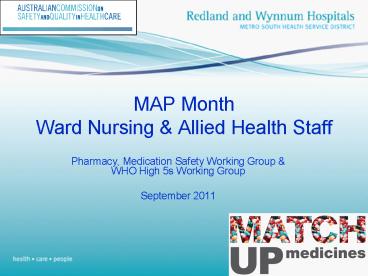MAP Month Ward Nursing - PowerPoint PPT Presentation
1 / 20
Title:
MAP Month Ward Nursing
Description:
... need to validate with more than 1 source Who looks after medications need to know so eg don t ask patient questions they can t answer Community carers ... – PowerPoint PPT presentation
Number of Views:74
Avg rating:3.0/5.0
Title: MAP Month Ward Nursing
1
MAP MonthWard Nursing Allied Health Staff
- Pharmacy, Medication Safety Working Group WHO
High 5s Working Group - September 2011
2
Agenda
- What is the MAP?
- Why have the MAP?
- How can you use the MAP?
3
What is the MAP form?
- MAP Medication Action Plan
- Clinical handover of medication management
- Admission BPMH reconciliation with medication
chart - Daily medication review issues log for
handover to prescribers and other clinicians - Discharge reconciliation discharge medication
record provision - Kept in bedside folder ALL clinicians have easy
access - A daily tool to improve patient care planning
for discharge
4
Why have the MAP form?
- 1 in 2 patients have one regular medication
omitted unintentionally on admission(1-3) - MAP allows MATCHING UP of medications at home
vs charted - Up to 5 medication histories documented per
patient per admission(4) - Do not correspond to each other, often
incomplete/inadequate, on 9 possible QH forms - BUT used as a baseline for future management
decisions - Decisions not clearly documented
- MAP a defined place to record medication
issues/planvs interspersed throughout progress
notes - Post-it note culture
- No formal tool for handover/documentation/interven
tions - Loss of information inefficiencies eg work
duplication - Facilitates timely discharge accurate
informationprovision to patient community
health-care providers - Part of Clinical Handover
- Issues resolved before discharge improve
bed-flow issues
(1) Stowasser DA. PhD The University of
Queensland 2000 (2) Lum E, MClinPharm The
University of Queensland 2002 (3) Cornish P,
Knowles S, Marchesano R, et al. Arch Intern Med
2005165424-9(4) QH Sites Baseline Audit 2005
(SMPU)
5
Mismatch?
- Plan was to Continue all meds
- BUT some meds not charted different doses
charted - ? Which is right??
6
Drs Plan column completed on admission enables
medication reconciliation with medication chart
7
Medication-Related Issues
Issues identified by ALL clinicians are noted on
the front page
8
What to document when issue identified
- Time date
- Clear, concise detail of issue
- Proposed action
- Person responsible to solve issue if notified
- Progress if appropriate
- Name contact number of person identifying issue
- Date result of action
9
Who can document on the MAP form
- ALL clinical team members
- Doctors
- Pharmacists
- Nursing Staff
- Allied Health (Dieticians, Speech Pathologist,
Physiotherapists, Occupational Health Therapists,
Social Workers and more)
10
A Nursing Example
- A great intervention, but
- No name of contact person, in case feedback is
needed - Not formally documented no record of
intervention - Post-it can easily be lost
- Could have been written on the MAP
11
(No Transcript)
12
Some real-life examples so far
13
Allied Health Examples
- Physiotherapist
- Mobility problems worsened by medications
- Medications potentiating falls
- Speech Pathologist
- Safety of crushed medications
- Medications affecting swallow/salivation
- Occupational Therapist
- Pt requiring dose administration aids (e.g.
Webster pack) - Falls risk and medication
14
- Social Worker
- Place of Discharge (Home Vs Nursing Home)
- Capability / frequency of carer
- Specialist Nurses
- Availability of alternative formulations/ drugs
- Medication review to identify medication
worsening disease - Dietician
- Medications affecting weight
- Interactions with medications and enteral feeding
- Nutritional supplement availability
15
- NB MAP doesnt replace a phone call if issue is
clinically urgent!
16
Best Possible Medication History (BPMH)
Record of all patients medication history as it
was just PRIOR to admission
17
Recent changes
BPMH documentation
2 sources required
Who looks after the medications
Drs plan INDEPENDENT Reconciliation
GP/Pharmacy/NH information
BPMH Risk Factor Checklist
18
How can you use this section?
- Doctors admission plan will be documented
- Use to answer patient/carer queries
- Add to BPMH if further information comes to hand
- Eg I havent received my Fosamax tablet that I
usually have on Fridays - Add further patient details as they come to hand
- Eg risk factors, nebuliser at home, is blind/deaf
19
Cross-referencing
- Alerts clinicians to availability of MAP and
issues raised - Prevents work duplication
20
Thank you!Questions































